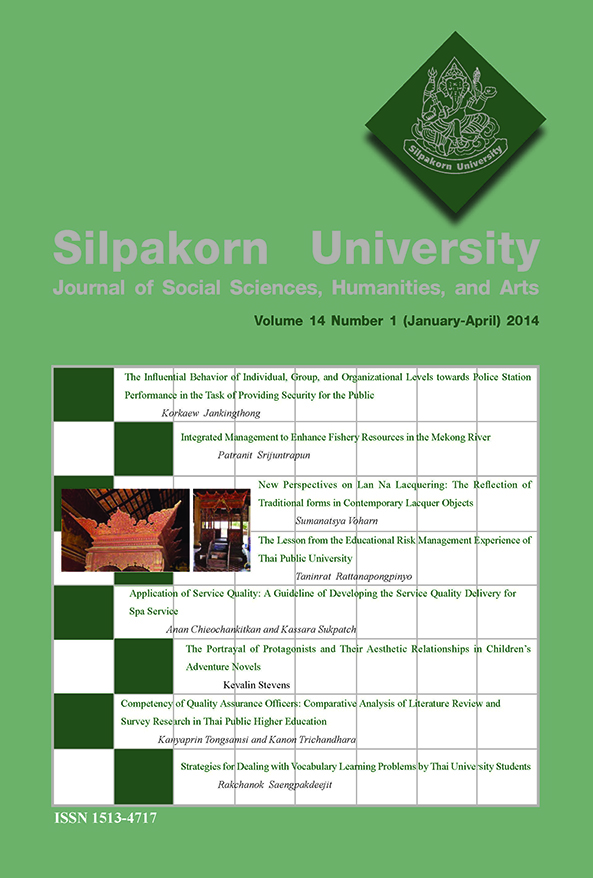Integrated Management to Enhance Fishery Resources in the Mekong River
Main Article Content
Abstract
Fishing resources of the Mekong River are crucial to the existence and livelihood of local communities and families. Heavy reliance is placed on fishing as a primary source of household food and income. Large-scale, development projects such as the construction of electricity producing dams aimed solely at regional economic growth have resulted in far-reaching ecological changes throughout the Mekong Region. These changes have had a profound impact at the local level. A combination of community based management and co-manage ment by local agencies has proven to be ineffective in doing so. A more encompassing, collaborative effort involving international, national, provincial, and community sectors is required. Only through vertical and horizontal cooperation by countries along the Mekong in the joint pursuit of sustainable fishery resource management can a balance between large-scale economic growth and local resource preservation be achieved.
Downloads
Article Details
All rights reserved. Apart from citations for the purposes of research, private study, or criticism and review,no part of this publication may be reproduced, stored or transmitted in any other form without prior written permission by the publisher.
References
Baird, I. G. and Mark, S. F. (2005) Mekong River Fish Conservation Zones in Southern Laos: Assessing Effectiveness Using Local Ecological Knowledge. Environmental Management 36(3): 439-454.
Berkes, F. (2006) From Community-based Resource Management to Complex Systems: the Scale Issue and Marine Commons. Ecology and Society 11(1): 45.
Berkes, F. George, P. and Preston, R. J. (1991) Co-management: the Evolution in Theory and Practice of the Joint Administration of Living Resources. Alternatives 18(2): 12-18.
Berkes, F. (2007)Community Based Conservationin aGlobalized World. Proceedings of the National Academy of Sciences 104 (39): 151-88.
Borrini-Feyerabend, G. Farvar, M. T. Nguinguiri, J. C., and Ndangng, V. A. (2000) Co-management of Natural Resources: Organizing Negotiation and Learning by Doing. Germany: Kasparek Verlag.
Dugan, P. (2008) Mainstream Dams as Barriers to Fish Migration: International Learning and Implication for the Mekong. Catch and Culture, 14: 9-15.
Dugan, P. J., Barlow, C., Agostinho, A. A., Baran, E., Cada, G. F., Chen, D., Cowx, I. G., Ferguson, J. W., Jutagate, T., Mallen-Cooper, M., Marmulla, G. et al. (2010) Fish Migration, Dams, and Loss of Ecosystem Services in the Mekong Basin. Ambio 39(4): 344-348.
Gardner, G. T. and Stern, P. C. (1996) Environmental Problems and Human Behaviour. Boston: Allyn & Bacon.
Hardin, G. (1968) The Tragedy of the Commons. Science 162(3859): 1243-1248.
Hortle, K. G. (2007) Consumption and Yield of Fish and Other Aquatic Animals from the Lower Mekong Basin. Vientiane: Mekong River Commission.
International Centre for Environmental Management. (2010) Strategic Environmental Assessment of Hydropower on the Mekong Mainstream. Hanoi, Viet Naam: Mekong River Commission. Australia: ICEM Australia.
Jeppesen, S., Andersen, J. E., and Madsen, V. P. (2006) Urban Environmental Management in Developing Countries - Land Use, Environmental Health and Pollution Management - A Review. Denmark: University of Copenhagen.
Mack, N., Woodsong, C., Kathleen, M., Guest, G., and Namey, D. (2005) Qualitative Research Methods: A Data Collector’s Field Guide. North Carolina: Family Health International.
Mekong River Commission. (2004) Annual Report of the MRC Programme for Fisheries Management and Development Cooperation, April 2003 - March 2004. Vientiane: Mekong River Commission.
Mekong River Commission. (2010) State of the Basin Report 2010. Vientiane: Mekong River Commission.
Murphree, M. W. (2002) Protected Areas and the Commons. Common Property Resource Digest 60: 1-3.
Orr, S., Pittock, J., Chapagain, A., and Dumaresq, D. (2012) Dams on the Mekong River: Lost Fish Protein and the Implications for Land and Water Resources. Global Environmental Change 22: 925-932.
Ostrom, E., Janssen, M. A., and Anderies, J. M. (2007) Going beyond Panaceas. Proceedings of the National Academy of Sciences USA104: 15176-15217.
Ostrom, E. (2002) The Drama of the Commons. Washington (DC): National Academy Press.
Ostrom, E. (2010) Beyond Markets and States: Polycentric Governance of Complex Economic Systems. American Economic Review 100(June 8): 641-672.
Pearse-Smith, S. W. D. (2012) The Impact of Continued Mekong Basin Hydropower Development on Local Livelihoods. Consilience: The Journal of Sustainable Development 7(1): 73-86.
Poulsen, A. F., Ouch, P., Sintavong, V., Suntornratana, U., and Tung, N. T. (2002) Fish Migrations of the Lower Mekong River Basin: Implications for Development, Planning and Environmental Management. Phnom Penh: Mekong River Commission.
Pretty, J. (2003) Social Capital and the Collective Management of Resources. Science 302(5652): 1912-1914.
Santasombat, Y., Hengsuwan, P.,Aunprasret, W., and Chunta, S. (2009) River of Life. Chaingmai: Chaingmai University.
Ziv, G., Baran, E., Nam, S., Rodríguez-Iturbe, I., and Levin, S. A. (2012) Trading-off Fish Biodiversity, Food Security, and Hydropower in the Mekong River Basin. Proceedings of the National Academy of Sciences 109(15): 5609-5614.


